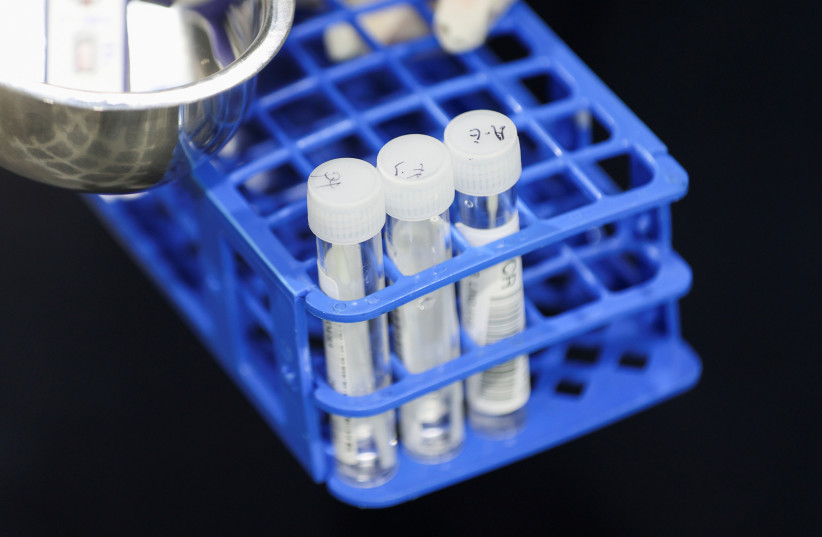Israel will hold off providing fourth jabs of the coronavirus vaccine, even as cases slowly rise in the country as the Omicron variant burns across the world.
Individuals double vaccinated against COVID-19 within the last six months can’t receive a booster and still need to wait to get their third jab, the Pandemic Response Team and the Advisory Committee on Vaccines said late Sunday night.
The committee met for several hours to discuss the issue, as 67 cases of Omicron were discovered in Israel and dozens more are under investigation.
The discussion came as new research is showing that two shots of the Pfizer vaccines are less effective against the variant and that three shots could provide greater protection against infection.
The committees also evaluated whether or not to give the fourth shot to people who are immunocompromised, elderly or at high risk for developing severe COVID-19 but decided against this as well.

However, the health officials did rule that the period of time between recovery and vaccination could be shortened from six months to three months.
The first Israeli children aged five to 11 received their second shots against the coronavirus Monday. Several hundred kids turned out at the health funds for their second shot and several thousand more to get their first.
Maccabi Health Services reported that so far it has vaccinated 44,500 children, Clalit reported vaccinating 54,000 and Meuhedet another roughly 13,000 kids. Leumit did not provide an update.
For weeks, children ages 5-11 have represented over 40% of the new cases recorded in the country, while the vaccination campaign has not proceeded as fast as the authorities had hoped.
Out of around 1.2 million eligible children, only 115,000 have gotten a shot.
While COVID is usually a mild disease for young children, a number of them suffer from more serious complications, including long-COVID and post COVID.
Earlier in the day, Hebrew media reported that a six-year-old child was pronounced dead at the Barzilai Medical Center after he lost consciousness as he was sleeping. Both the boy and his siblings had had COVID in the past, but it was not immediately clear whether there was any connection. Medical experts were set to examine the child’s body and check his siblings to ascertain the situation.
The country has also started to vaccinate students in schools, as part of the government’s efforts to step up immunization among the population to prevent or at least limit an outbreak of the new Omicron variant.
So far, according to data shared Monday by the Health Ministry, more than 1,100 students had gotten their first jab in schools the day before.
“We still do not know if we are at the beginning of a fifth wave, but we do know that the vaccine can prevent the next outbreak,” said Dr. Angela Urbani, head of the Sharon district at Maccabi.
While still caused by the Delta variant as opposed to Omicron, morbidity in Israel has been slightly on the rise in the past few weeks, with the average number of new daily cases going up weekly. There was an average of 456 daily cases in the third week of November, compared to 610 last week.
Meanwhile, the reproduction or “R” rate has fluctuated between 1 and 1.12, meaning that infections are rising, albeit only moderately. On Monday, the R was holding at 1.08.
There were 487 new virus carriers identified on the previous day. A week earlier they were 543.
Health Ministry Nitzan Horowitz and Interior Ministry Ayelet Shaked on Monday approved the designation of the UK and Denmark as red countries beginning midnight Wednesday night.
Israelis cannot travel to red countries unless they obtain special permission, and when they return must quarantine for at least one week regardless of their immunization status. Currently, 50 African countries are on the list.
The previous day, the government extended the travel restrictions passed against Omicron at the end of last month in order to delay the spread of the variant in the country as much as possible and buy time to increase the number of fully vaccinated people, including adults who still need to get their first dose – around 700,000 – and over a million individuals who need to receive a booster, as they are over five months after having had two shots.
Finally, a strange malfunction reportedly caused the Health Ministry to send out a false announcement to the operators of testing stations that due to the fact that there were no longer enough funds, Green Pass checkpoints would be closed.
The ministry confirmed the issue and said in a statement by the coronavirus outreach headquarters that “due to a malfunction, an error message was issued to the antigen testing complexes about the shutdown. The fault has been rectified and the activity of the antigen testing complexes will continue as normal.”
